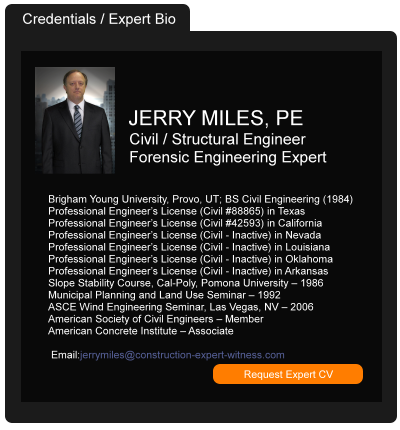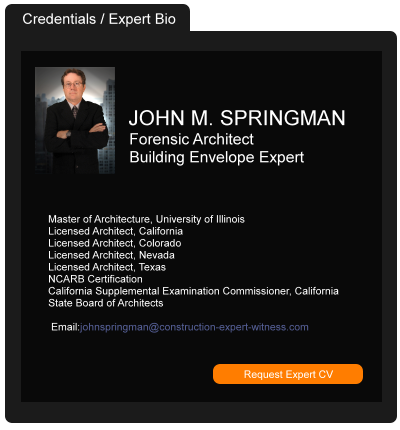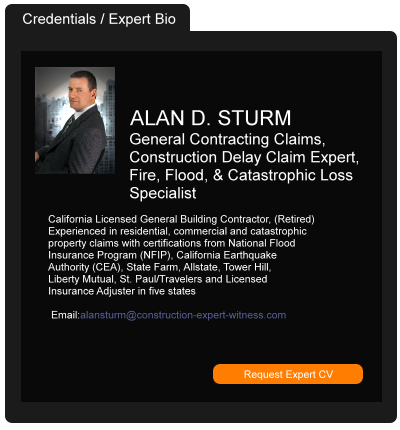Can Your Employee File a Personal Injury Claim if They’re Injured at Work?
March 14, 2022 —
Louis Patino - Construction ExecutiveConstruction accidents can happen to anyone. It’s common for employees to work at height, with machinery or alongside any number of potential hazards, so it’s no surprise that injury rates in construction are 71% higher compared to other industries.
Anything from a ladder manufacturing defect to an unguarded ledge or wet surface can increase the likelihood of a fall, but those aren’t the only dangers. If scaffolding collapses due to an excessive load or improper construction, it can prove fatal.
Then, there are struck-by hazards—one of the Occupational Safety and Health Administration’s (OSHA) “Fatal Four”—including falling, swinging and rolling objects; crane misuse; electrical faults; and issues with personal protective equipment. These are all hazards construction workers have to contend with daily.
Reprinted courtesy of
Louis Patino, Construction Executive, a publication of Associated Builders and Contractors. All rights reserved.
Read the court decisionRead the full story...Reprinted courtesy of
Apprentices on Public Works Projects: Sometimes it’s Not What You Do But Who You Do the Work For That Counts
September 17, 2015 —
Garret Murai – California Construction Law BlogIf you’re a public works contractor in California you’re familiar with prevailing wages. The Prevailing Wage Law, a Depression era law designed to encourage the hiring of local labor, sets a minimum wage that employers must pay to workers on public works projects.
But because the Prevailing Wage Law sets a floor on wages it also limits the opportunity for lesser-skilled workers to gain experience. To address this, the Prevailing Wage Law permits contractors to pay apprentices a lower “apprentice wage” if the apprentice is enrolled in a state-approved apprenticeship program and requires contractors who hire workers in an “apprenticeable craft or trade” to hire a certain number of apprentices.
But are particular apprentices required to be hired depending on the type of work being performed? In Henson v. C. Overaa & Company, Case No A139966 (June 29, 2015), the California Court of Appeals for the First District held that apprentices are required to be hired based on the craft or trade of the journeymen performing work not based on the type of work being performed.
Read the court decisionRead the full story...Reprinted courtesy of
Garret Murai, Wendel Rosen Black & Dean LLPMr. Murai may be contacted at
gmurai@wendel.com
Tension Over Municipal Gas Bans Creates Uncertainty for Real Estate Developers
February 07, 2022 —
Sidney L. Fowler, Robert G. Howard & Emily Huang - Gravel2Gavel Construction & Real Estate Law BlogOn November 15, 2021, the New York City Council approved a bill banning gas hookups in new buildings, making the biggest city in the U.S. the latest in a string of municipalities to prohibit natural gas infrastructure in new homes and buildings. In the two-and-a-half years since Berkeley, California, passed its then-novel municipal ban on new natural gas infrastructure, numerous cities have found themselves at odds with state governments and industry groups on the issue of full electrification in residential and commercial real estate. The resulting disputes, litigation and regulatory uncertainty have created headaches for the real estate industry. Although not all view the restrictions as negative, and many developers have embraced the push for more climate-neutral buildings, these bans introduce complexity to the real estate market, raising additional legal and commercial challenges.
Background
According to the U.S. Environmental Protection Agency, the use of natural gas in homes and businesses accounts for 13 percent of annual U.S. greenhouse gas emissions. For that reason, advocacy groups have pushed cities to prohibit natural gas infrastructure in new construction and encourage full electrification of newly constructed buildings. In addition to New York and Berkeley, cities that have either passed or considered such ordinances include San Francisco, Sacramento, Seattle and Denver, as well as numerous smaller cities. New York City’s newly passed gas ban, in particular, prohibits natural gas hookups in new buildings under seven stories by 2024, and in taller buildings by 2027, but exempts hookups in commercial kitchens.
Reprinted courtesy of
Sidney L. Fowler, Pillsbury,
Robert G. Howard, Pillsbury and
Emily Huang, Pillsbury
Mr. Fowler may be contacted at sidney.fowler@pillsburylaw.com
Mr. Howard may be contacted at robert.howard@pillsburylaw.com
Ms. Huang may be contacted at emily.huang@pillsburylaw.com
Read the court decisionRead the full story...Reprinted courtesy of
No Coverage Based Upon Your Prior Work Exclusion
October 01, 2014 —
Tred R. Eyerly – Insurance Law HawaiiThe California Court of Appeal affirmed the trial court's determination of no coverage for construction defects based upon the policy's prior work exclusion. Yu v. Landmark Am. Ins. Co., 2014 Cal. App. Unpub. LEXIS 5966 (Cal. Ct. App. Aug. 22, 2014).
Plaintiff was the owner and developer of a hotel. She contracted with ATMI Design Build to act as general contractor to construct the hotel. C&A Framing Company was a subcontractor to provide rough framing for the project. In May 2003, ATMI fired C&A before it had completed all the work required by the subcontract. After May 2003, C&A never returned to the construction site. Notice of Completion for the project was recorded April 15, 2004.
In September 2004, Landmark issued to C&A a CGL policy for the period September 18, 2004 to September 18, 2005. The policy was later cancelled, effective January 14, 2005. The policy contained an endorsement entitled, "Exclusion - Your Prior Work." The exclusion barred coverage for "'property damage' arising out of 'your work' prior to 9/18/04."
Read the court decisionRead the full story...Reprinted courtesy of
Tred R. Eyerly, Insurance Law HawaiiMr. Eyerly may be contacted at
te@hawaiilawyer.com
Sometimes You Get Away with Default (but don’t count on it)
July 27, 2020 —
Christopher G. Hill - Construction Law MusingsAs an almost universal rule here in Virginia, failing to show up for court or respond to a lawsuit is a bad idea. Consequences include default judgment against you without the right to defend or make your case. Courts simply enter judgment and the consequences of that judgment will follow.
However, and as is often the case around here, there are small exceptions where the courts of Virginia allow the defaulting party off the hook. Sullivan Mechanical Contractors, Inc. v. KBE Building Corporation is just such a case. In Sullivan Mechanical, the Federal District Court for the Western District of Virginia was faced with a Motion to Vacate Default Judgment from KBE. The facts are laid out in the opinion, but basically come down to the usual subcontractor not paid by the general contractor and general contractor has reasons for non-payment. Subcontractor, Sullivan Mechanical, sued KBE and KBE failed to respond in a timely manner. One day after the deadline for response had passed, Sullivan moved for entry of default and the clerk entered the default that same day. KBE moved to vacate the default a mere 6 days after entry of default.
Read the court decisionRead the full story...Reprinted courtesy of
The Law Office of Christopher G. HillMr. Hill may be contacted at
chrisghill@constructionlawva.com
Asbestos Confirmed After New York City Steam Pipe Blast
July 21, 2018 —
Eydie Cubarrubia - Engineering News-RecordAsbestos has been found at the site where an underground steam pipe exploded early Thursday morning near the Flatiron building in midtown Manhattan.
Read the court decisionRead the full story...Reprinted courtesy of
Eydie Cubarrubia, ENRMs. Cubarrubia may be contacted at
cubarrubiae@enr.com
New York Construction Practice Team Obtains Summary Judgment and Dismissal of Labor Law Claims
October 01, 2024 —
Lewis Brisbois NewsroomNew York, N.Y. (August 23, 2024) – In Trujillo-Cruz v. City of New York, et al., New York Partner Inderjit Dhami, a member of New York Partner Meghan A. Cavalieri’s Construction Practice Team, recently obtained summary judgment and dismissal of the plaintiff's Labor Law §240(1), §241(6) and §200 claims dismissing the entire case against national developer and construction company clients.
The plaintiff alleged to have sustained injuries as the result of a construction site accident occurring on July 11, 2018, while in the scope of his employment as a laborer in connection with the construction/renovation of a residential apartment building in Brooklyn, New York. Specifically, the plaintiff alleged that he was injured when he was coming down from a ladder and fell on a 2”x 4”, causing him disabling injuries. The plaintiffs’ counsel articulated a $3 million settlement demand.
Labor Law §240(1) imposes absolute liability on a defendant where an injured worker engaged in the performance of covered construction work establishes that a safety device proved inadequate to shield him from elevation-related harm, and that the defendant’s failure to provide an adequate safety device proximately caused the injuries alleged. The plaintiff first testified that he stepped on the 2” x 4” after he came down off of the ladder, but his counsel then prompted him to recalibrate his testimony by asking whether the accident arose when he was coming down the ladder or after he had come down off of the ladder. The plaintiff changed his testimony, alleging that the accident arose as he was coming down the ladder and that he remained partially on the ladder when he stepped on the piece of formwork and fell. Inderjit argued that the plaintiff’s reframing of his deposition testimony was immaterial for purposes of the Labor Law § 240 (1) analysis. Irrespective of whether the plaintiff was on solid ground or had one foot on the ladder at the time of the occurrence, his Labor Law § 240 (1) claim was unavailing in that the accident did not arise as a result of the type of extraordinary elevation-related peril protected by Labor Law § 240 (1). Justice Maslow agreed and dismissed the plaintiff’s Labor Law § 240 (1) claims.
Read the court decisionRead the full story...Reprinted courtesy of
Lewis Brisbois
Union Handbilling: When, Where, and Why it is Legal
November 06, 2018 —
Wally Zimolong - Supplemental ConditionsA few days ago, IBEW Local 98 began began protesting a restaurant owned by professional football player Jahri Evans. The organizers are accusing Evans of violating local construction wage standards and are advertising their dispute with “handbills.”
What are handbills?
Walking down Fremont Street in Las Vegas is impossible without one or several characters putting a small business card with “questionable” adult entertainment advertisements in your hand. Some will slap papers to your chest, leaving you no choice but to grab the flyers.
On a different level, this action occurs on a regular basis by union member. But instead of shady characters pushing questionable entertainment, it is union representatives pushing a dispute with a local employer over working conditions. However, in either case the practice is known as i as handbilling.
Read the court decisionRead the full story...Reprinted courtesy of
Wally Zimolong, Zimolong LLCMr. Zimolong may be contacted at
wally@zimolonglaw.com


































































